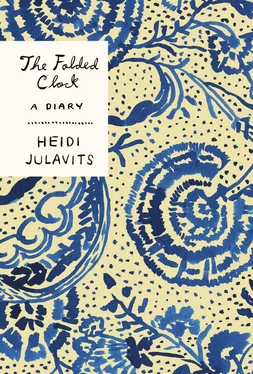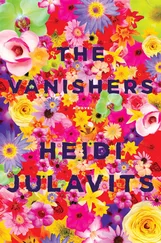Today I went drinking with a former student who asked me, “Are you proud of your hands?”
I thought what a good question this was. As a professor, I am always struggling to ask good questions. How can a question be an invitation, not a test? Questions with answers make people scared. If you’re an up-rounder, 100 percent of possible responses to questions with answers are incorrect. The odds totally favor wrongness. Good questions can initiate a surprising wend toward an answer that is neither right nor wrong, but can be judged as strong or weak or honest or dishonest on the basis of the steps that brought the answerer there. It is a built thing. Sometimes what it builds is bullshit, but the bullshit can be so well-constructed that it has integrity, a pattern integrity. This can be worth admiring.
I admitted I was proud of my hands, though this hasn’t always been the case. I used to hate my hands. Their fingers are short, the nails bitten. When anxious, I unthinkingly chew holes in my hands. Often I do this when I’m teaching or on a stage. I’ve been on a stage and chewed a bloody hole where once there was a cuticle, and have had to scramble to find a piece of paper with which to blot the flow. Occasionally, while teaching or on stage, I’ve had to suck on my finger to keep the blood from going everywhere.
In the past I have suffered hand jealousy. Mine are stubby, with fingernails shaped like sideways rectangles. My left hand is visibly smaller than the right. I have one finger on which I can wear normal-sized rings, because the rest of my fingers I jammed playing basketball. I jammed them shorter and fatter. In the case of some rings, they do not make them big enough for my fingers.
It was fortunate, I guess, that the one normal-sized finger I possess is the finger on which wedding rings are meant to go. When I was first married, I was much more interested in wedding-type wedding rings, and those rings tend to be small, especially if you’re broke, because you have to buy them used, and so they tend to date back to an age when people and fingers were tinier. My first husband and I bought my wedding ring at a pawnshop. People marveled at our brazenness. “Isn’t it bad luck to buy a secondhand wedding ring?” These people assumed the ring had been sold to the pawnshop following a divorce. My first husband preferred to think the woman who’d once owned the ring had died in a sky-diving accident. Years after our divorce, I still own the ring. I keep it in a small box with old business cards and postage stamps of outdated denominations. The box moves around my Maine home, sometimes in this room, sometimes in that. As with many things I don’t keep track of or care much about, I never lose it.
Today I went to an art museum to see a show. I wanted to escape my head because my head is so stupid these days. I wanted to be inside someone else’s head. So I went to a show recommended by a young woman I work with. This young woman is dreamily and predatorially beautiful; she is nervously smart. She dresses to highlight her astonishing legs, and she looks at you as though she is planning to give your face a blow job. This sounds both more disgusting and less complimentary than I mean it to. I am transfixed by the way she looks at me. I find a coy boldness in her to admire. She’s giving your face a blow job while talking about Deleuze.
I was interested in the artist this young woman recommended because the artist paints and does video and sculpts and knits. I figured this artist’s head was voracious and energetic and a generally good place for a blue person to spend the day. This did not turn out to be the case. Her installation was on the fourth of six very tall floors. The elevator failed and failed to come. Waiting for it stretched me to the breaking point. A drink would have done me, or a drink plus a controlled substance, or an uncontrolled substance plus a love affair, or all of these plus a leap from a high window. For some reason I thought an art show would reroute my defective circuitry. I thought an art show would keep me from more ridiculous alternatives.
Once the elevator opened onto the fourth floor, I exited, I ran. I did a few laps, waiting for my jaggy attention to catch on a photo or a painting so that I could enter this other person’s head. I found no gateway. I slid over surfaces, uninteresting surfaces. The reviews I’d read made her work sound so intellectually sensual and object-driven, but where were the intellectually sensual objects? The reviews made her sound like a thoughtful hoarder, but where was the seductive clutter? I found the show so unfocused and completely disconnected and random. I had no idea who this woman was or what unified her curiosity or her drive. It might have been a group exhibition. I took the stairs to the third floor, where the exhibit continued, and where I turned her failure into my own. I am a jack-of-all-trades. I edit and teach and at times desire to be a clothing designer or an artist (one who doesn’t draw or paint or sew) and I write everything but poetry and I am a mother and a social maniac and a misanthrope and a burgeoning self-help guru and a girl who wants to look pretty and a girl who wants to look sexy and a girl who wants to look girly and a woman in her middle forties who wishes not to look like anything at all, who wishes sometimes to vanish. I thought of what a person said to me once about my short stories—“as a short story writer I just don’t know who you are .” I thought of how I’d screwed up somewhere, that in trying to be so many things and people I’d failed to be even one good thing or one good person. And how now I really, really needed a drink, or I really needed to fall in love with any old human, except that I felt so unattractive today.
I left the museum and went to a clothing store. I thought I might buy a dress to make me feel better. I didn’t find that dress. I left the clothing store and went to a bookstore. I thought I might find a book to help me feel better, but I forgot that writers, after they publish books, can rarely enter bookstores and leave happier. Even if you are a writer who never reads her Amazon reviews, the bookstore is a reminder of how not beloved you are. If your books are on the front table, the pile is too tall; clearly nobody has bought any copies. If your books are not on the front table, so much the worse. You’re reminded how they might be on the front table if you ever made any sort of effort with booksellers, but you don’t, not even the one in your own neighborhood, the one you can practically see from your apartment. You are reminded of how you make a hard situation — surviving as a writer — much harder for yourself by refusing to help yourself, and why? Why do you refuse when you love to meet people, and are so chatty and personable, but usually only with non-bookstore-owning strangers? Why, when you shop at your local bookstore, even on those days when your book is on the front table, do you insist on anonymity?
On this day, in this mood, in this bookstore, anonymity was the only option. I did laps. I decided I should read a biography but I couldn’t find BIOGRAPHY, and human assistance was out of the question. I didn’t know how to ask a question without turning the exchange into something awkward over which I’d self-castigate for the next hour. I looked and I looked. There were people in every nook, hanging out and talking and working on computers. I looked at one person for quite a while before I recognized the young woman who gives blow jobs to faces, the woman who had suggested I see the art show I’d just seen.
We said our surprised hellos. Adding to the tension, which possibly existed only for me, was the fact that the last e-mail exchange we’d had had been of a very personal nature, and I’d failed to follow up. I wrote to her, she wrote to me, I didn’t respond. We’d been writing to each other about our respective abortions. I knew of hers because she’d told me about it a few months back. I treated her abortion as an intellectual conceit because she was treating it as an intellectual conceit, and writing an intellectual essay about her choice to terminate a midterm pregnancy. Later I’d done some math; I realized that I’d had my abortion twenty-five years ago and that this woman was as old as the child I didn’t have. I don’t usually give my aborted child a body or a life; I don’t date it or pull it with me through time. I don’t really think about it at all. Which is why I was so shocked to contemplate that, had I not aborted this child, it would now be old enough to get its own abortion. Also, this girl’s mother had gotten pregnant very young, at about the age that I did. Unlike me, she didn’t have an abortion. She had this girl.
Читать дальше












